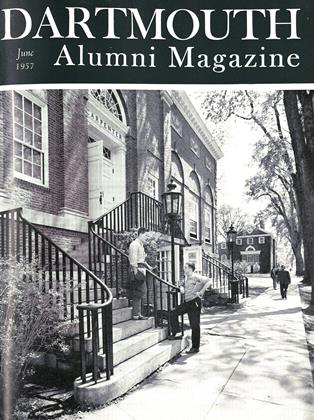By Harold J. Berman '38. Brooklyn: The Foundation Press, 1956. 179 pp.
In November 1954 a three-day Conference on the Teaching of Law in the Liberal Arts Curriculum was held at the Harvard Law School. The thirty-one participants included professors from law schools and undergraduate colleges, several practicing lawyers, a businessman, and a judge. Rather than publish the bulky transcript, the committee in charge of the conference asked Harold J. Berman '38, Professor of Law at Harvard University, to prepare a synthesis of the discussions.
Utilizing large portions of the actual conference discussions and weaving these together with his own introductory and summary pas- sages, Professor Berman has made available a highly useful attempt to answer a troublesome and controversial question — Is law a proper subject of study in the liberal arts curriculum? Some indication of the range of the analysis is seen in the headings which Professor Berman gives to the three chapters into which his volume is divided: "Why Students of the Arts and Sciences Should Have an Understanding of Law"; "How an Understanding of Law can be Taught in the Liberal Arts Curriculum"; and "Ways and Means of Introducing Law Teaching into the Liberal Arts Curriculum."
It is not surprising that such questions provoked wide differences of opinion among the conferees. None thought that liberal arts colleges should attempt to teach the substance of private law except as necessary to give meaning to the study of the history of law, or the social role of law. A few doubted that even these latter approaches to the study of law can be successfully made at the undergraduate level. At the other extreme, Dean Carl B. Spaeth (Dartmouth '29) of the Stanford Law School advocated the introduction, on an experimental basis at a few liberal arts colleges, of an entire major on "Law and Society."
Dartmouth has long offered courses in the field of public law (constitutional law, international law, and administrative law) and in jurisprudence as well. The late Professor James F. Colby '72 and Professor James P. Richardson '99 between them taught such courses at Dartmouth for half a century and the tradition they established remains strong today. It is reassuring to find much support in Professor Berman's little volume for this tradition.
 View Full Issue
View Full Issue
More From This Issue
-
 Feature
FeatureThirty Years After
June 1957 By RICHARD W. HUSBAND '26, -
 Feature
FeatureAssignment: Antarctica
June 1957 By DON GUY '38, -
 Feature
FeatureIGY
June 1957 By PROF. MILLETT G. MORGAN -
 Feature
FeatureConquest of the Antarctic
June 1957 By DAVID C. NUTT '41, -
 Class Notes
Class Notes1930
June 1957 By RICHARD W. BOWLEN, FREDERICK K. WATSON -
 Class Notes
Class Notes1926
June 1957 By HERBERT H. HARWOOD, ANDREW J. O'CONNOR
ROBERT K. CARR '29
-
 Books
BooksLAWYERS AND THE CONSTITUTION: HOW LAISSEZ FAIRE CAME TO THE SUPREME COURT
October 1942 By Robert K. Carr '29 -
 Books
BooksTHE BATTLE AGAINST ISOLATION.
January 1945 By Robert K. Carr '29 -
 Books
BooksFUNDAMENTALS OF SOCIAL SCIENCE
October 1946 By Robert K. Carr '29 -
 Books
BooksWhat Went Awry in Miami
May 1975 By ROBERT K. CARR '29







